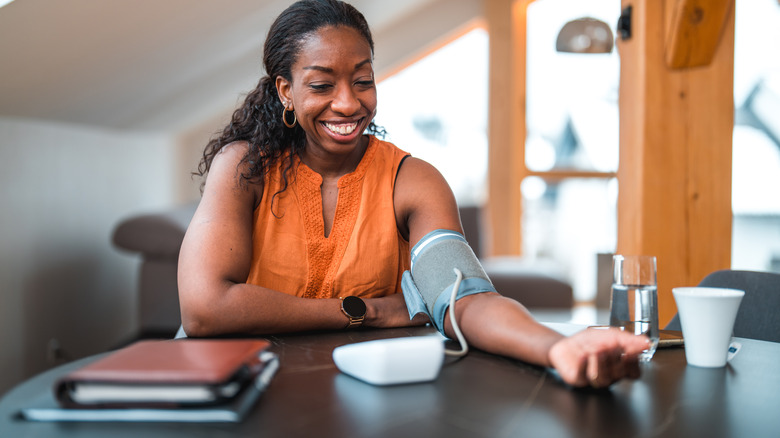Weird Factors That Can (Falsely) Raise Your Blood Pressure Levels
Blood pressure is a vital parameter that provides insights into the health of your cardiovascular system. It measures the force exerted by the blood against the walls of your arteries as it circulates throughout the body (per Johns Hopkins Medicine). According to the American Heart Association (AHA), maintaining healthy blood pressure is essential for overall well-being, as high blood pressure, also known as "hypertension," is a known risk factor for heart disease, stroke, and other serious health conditions. Accurate blood pressure measurements are the cornerstone of diagnosis and management. They inform you and your healthcare provider about your heart's workload and the condition of your blood vessels.
Yet, blood pressure is not a static number; it can fluctuate due to various factors. Some of these factors are relatively unknown and, in some cases, quite peculiar. From the caffeine in your morning coffee or the stress of daily life to the medications you may be taking, the quality of your sleep, and even the position you're sitting in, there are hidden elements affecting your blood pressure that you might not be aware of. Understanding these influences will not only demystify blood pressure but also empower you to take better control of your cardiovascular health.
White coat syndrome can raise blood pressure
Going to the doctor's office can be nerve-wracking for many people. Seeing a medical professional can cause blood pressure to spike, a phenomenon known as "white coat syndrome" or "white coat hypertension." This can give you falsely elevated readings that make you even more anxious. Fear and anxiety around medical settings can cause your body to release stress hormones like adrenaline, which temporarily raise your blood pressure. According to the Cleveland Clinic, white coat syndrome affects 15% to 30% of people with hypertension, but it can also affect people without high blood pressure.
Managing white coat syndrome is essential for accurate blood pressure measurement. Relaxation techniques like deep breathing and meditation can help you feel calmer and more comfortable during your appointment. Checking your blood pressure outside a clinical setting can give you a better idea of your baseline readings. And, if you're feeling nervous, don't be afraid to talk to your healthcare provider about it! They're there to help you, after all.
How you take your blood pressure matters too
Accurate blood pressure measurements depend on how you position your body and use the equipment. For instance, a study published in 2007 in Blood Pressure Monitoring found that crossing your legs at the knee level resulted in a significant increase in both systolic and diastolic blood pressure readings. This is because it can block blood flow and increase pressure in your leg arteries, making it seem like your blood pressure is higher than it really is. To ensure you get accurate readings, keep your feet flat on the floor and your back supported by a chair, and keep your arm at heart level (via AHA).
Another unexpected factor affecting your blood pressure readings is having a full bladder. An older 1989 study published in Circulation showed that a distended bladder can stimulate the sympathetic nervous system, increasing blood pressure temporarily. To avoid this, using the restroom before checking your blood pressure is advisable, especially if you've had a large meal or consumed significant amounts of fluids.
It's also important to make sure your arm is supported correctly because if it's not, the reading might be higher than it should be. Rest your arm on a flat surface, like a table, and at heart level to help minimize muscle tension that could affect the reading. In addition, avoid placing the blood pressure monitor cuff over clothing. Doing so can cause the reading to be higher than it should be. Instead, roll up your sleeve and put the cuff directly on your bare arm.
Temperature can also impact blood pressure
The relationship between temperature and blood pressure is complicated. It's not just about the weather conditions but also includes other factors such as fever. For example, during hot weather, our bodies tend to release excess heat by dilating blood vessels, which can cause a temporary drop in blood pressure (per British Heart Foundation). On the other hand, cold weather can cause us to conserve body heat by constricting blood vessels and temporarily increasing blood pressure (per Mayo Clinic).
Fever can also affect blood pressure. Your body temperature rises when you get a fever, which can cause your heart to pump blood faster to release the extra heat. This, in turn, can increase your blood pressure. Also, fever- or infection-induced dehydration can cause a rise in blood pressure (per Healthline). Keeping yourself hydrated and cool during a fever can help you avoid negative impacts on your blood pressure.
It's additionally worth noting that these temperature-related changes are usually temporary and your blood pressure tends to return to normal levels once the fever subsides or the weather becomes more comfortable. However, if you're sensitive to temperature changes or you have underlying cardiovascular conditions, it's always best to check with a healthcare provider to monitor and manage your blood pressure in these situations.




